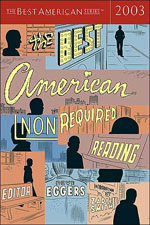[Transcribed discussion of “Wild Berry Blue,” by Rivka Galchen, published in Open City.
In this story, the narrator—a girl in elementary school—falls in love with a cashier at McDonald's called Roy. Every Saturday morning she goes for cookies and milk with her dad. One day she notices Roy working. She describes seeing him for the first time: “In a trembling moment I shift my gaze up to the engraved nametag. There’s a yellow M emblem, then Roy.” She is overcome, she says, by “this beautiful feeling. I haven’t had it about a person before. Not in this way.” She spends the rest of the story trying to catch his eye, trying to make conversation, or pining over him, or searching for the perfect present for him—a wooden puppet from the medieval faire is what she settles on. In the end though, the puppet has a crack. She doesn’t give it to Roy. She realizes things aren’t going to work out. She tries to move on.]
Chloe: I have a weakness for really emotional stories like this, so I loved it. I love stories where it seems like the narrator is talking straight from her consciousness. And there are enough really interesting parts to this piece—the way the little girl introduces people in the story, the way she describes characters, like Roy with that Tattoo, or the ugly puppet stand vendor fiddling with his collar—to keep me really interested the whole time.
Roxie: I like it because she’s so serious. The author is fully in the fifth grade self. I totally hear this little girl talking when I read this story. The author shows us the pure emotion and the outburst of need a little girl can have inside her. I mean, this is the girl’s first love. It was convincing. This is how it felt to be a girl in fifth grade, I think.
Fiona: The writing was good. It all felt really real. That was important, I thought. That it felt real.
Yael: One of the things I thought was very real was the way she has this sense security with her dad. The girl feels dangerous for breaking out and liking this Roy character. That’s such a true, typical feeling for a daughter to have.
[The students were asked what the wooden puppet’s role in the story is.]
Bora: The doll is a physical representation of the mistake that she’s made in loving Roy. Once she notices that there’s a crack on the hand, she doesn’t want it. And she starts to notice that there’s a mistake in the way she’s looking at things with Roy. It can’t work out. The way the author uses a doll to convey this is so well done. I thought the writing in general was excellent. Her description of herself on page 80 reminds me of myself: “I was always that kind of kid who crawled into bed with her parents, who felt safe only with them.” Or her description of the McDonald's scene, it’s amazing the way she captures a child’s perspective. She makes dipping cookies in milk interesting to read about: “Sometimes, dipping my McDonaldland cookies—Fryguy, Grimace—I’d hold a cookie in the milk too long and it would saturate and crumble to the bottom of the carton. There, it was something mealy, vulgar. Horrible. I’d lose my appetite. Though the surface of the milk often remained pristine I could feel the cookie’s presence down below, lurking. Like some ancient bottom-dwelling fish with both eyes on one side of his head.”
Roxie: I also like how, throughout the story, the girl connects things to the future. Like when she says at the end, “I never got over him. I never get over anyone.”
Charley: This girl is such a specific and whole person. She has little tics, like how she likes to wash herself in the sink, that round her out. Her very specific personal preferences like that make her come to life for us as we read.
Subscribe to:
Post Comments (Atom)









No comments:
Post a Comment